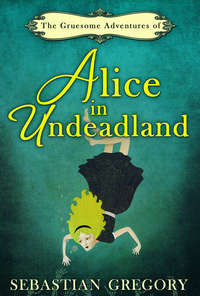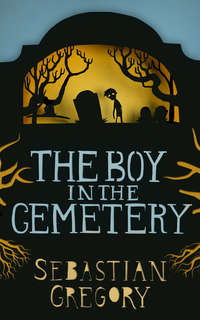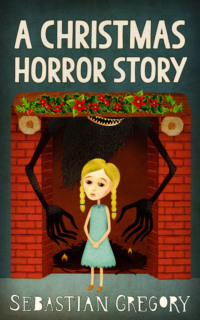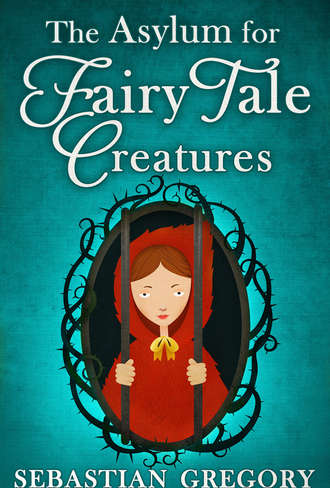
Полная версия
The Asylum For Fairy-Tale Creatures

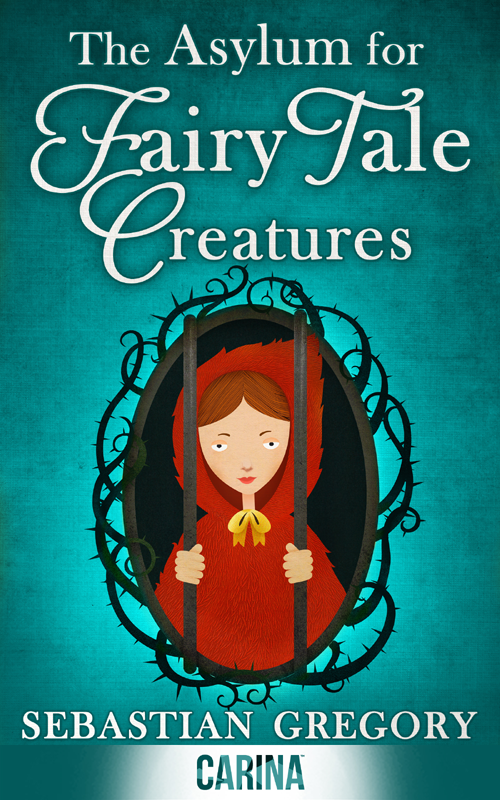
Once upon a nightmare…
Long ago, in a land where imagination meets the darkest nightmares, they built the asylum. Surrounded by a forest of thorns, it holds the most twisted minds in the fairy tale kingdom: a terrible collection of evil creatures and forgotten souls. Imprisoned within its walls, they are doomed to spend forever after telling their tales… and serving as a warning to others.
Now, you are invited to accompany Blood Red Riding Hood into the depths of this strange place – where you will meet its even stranger inhabitants. But be warned: walls this thick were built to withstand the darkest magic… so once you’re inside, you might just find yourself living horribly ever after… and wishing you were indeed in a land far, far away.
Also by Sebastian Gregory
The Gruesome Adventures of Alice in Undeadland
The Asylum for Fairy Tale Creatures
Sebastian Gregory

Sebastian Gregory (pronounced Gre-gory) writes from a cabin in the middle of a haunted wood. His inspiration comes from the strange and sorrowful whispers amongst the ghastly looking trees. Sebastian is only permitted to leave the shadowy candlelight of the cabin once a story is complete, when it is unleashed upon the world of the living. Sebastian writes for the younger readers as they are easier to terrify than adults whose imaginations died long ago.
When not writing in a cabin in the middle of a haunted wood, Sebastian lives in Manchester with his family and various animals.
You can email Sebastian on writtenbyseb@hotmail.co.uk—he would love your feedback.
You can follow him on Twitter @wordsbyseb
You can stalk him on Facebook https://www.facebook.com/writtenbyseb
To Sharon, Katie, Emily, Jake, Wilhelm and Jacob, welcome to the madhouse.
Contents
Cover
Blurb
Book List
Title Page
Author Bio
Dedication
Once Upon a Time
Blood Red Riding Hood
The Thread Bear
Thumbeana
The Asylum for Fairy Tale Creatures
Doctor Grimm’s Notebook: Rapunzel
Doctor Grimm’s Notebook: Cinderella
Doctor Grimm’s Notebook: Beauty
A Leech a Day Keeps the Doctor Away
And There Was Insanity Forever Ever After
Mostly Contented Ever After
Extract
Endpages
Copyright
Once Upon a Time
Once upon a forever more, a long time ago in the dark place where imagination and nightmare met, they built the asylum. Surrounded by a forest of dense thorns and crumbling on a precipice falling to an infested monster sea, the asylum held the most insane in the entire fairy tale kingdom.
To be poor abandoned children in the forest, left to the whims of the nearby witch in her gingerbread house - imagine how frail your mind would become. Imagine the trauma of finding a house inhabited by bears who think they are people. How about being a boy made of wood who can think and talk yet is ridiculed and shunned. Or a girl given to a reclusive beast by her own father. It would be enough to drive a person to madness. And so many of the fairy tale creatures went skipping into the comfort of insanity.
Their demented wails carried through barred windows and into a rainstorm to haunt the turbulent air. A raven followed the cries to a break in the highest tower roof. The rain dripped from cracks in the slates. On the rafters the raven shook off the rain and cawed to itself, tipping its head this way and that with dark curiosity, before swooping downwards through the rafters and away amongst stone corridors. Flying between the shadows of the gas lamps, the raven passed the padded cells of the asylum’s inhabitants. All and more locked behind deep oak doors for evermore. The raven explored further, gliding along until it came to a spiral staircase. It landed on the stone steps a moment, hopping and pecking before flying off again, downwards. To another corridor and, if it were not a fool bird, the raven would have noticed something different. There was only one door at the end of a dark hallway of stone, bolts and chains and huge padlocks holding it firmly sealed. The raven did not concern itself with this and settled on the bars of the door; it cawed and pecked at the metal with a rat-tat-tat. For a moment something reflected in its onyx eye; from the gap in the bars a bony finger, unexpected and quick, simply brushed the poor creature with all the force of a breath on a nape. The raven cried its last and disappeared, falling within. There was a momentary sound of bones falling on stone, a kind of rattle before everything was silent again, save for the distant sound of the storm, and the ravings of the insane fairy tale creatures.
Blood Red Riding Hood
The woods held no fear for the girl. She followed her grandma’s advice and her boots held to the path hidden amongst the moss and shed leaves. Thick and ancient trees, old and wise, smiled with knotted faces that only the girl could see. Beams of bright yellow split through the dense overhead canopy and created a dark green rainbow. Her way was clearly lit through The Dark-Dark Forest. And the girl loved this place; it was so mysterious, so gloomy but so full of life. Birds perched heavy on the branches and screamed into the air; insects danced strange fandangos to the sound. Creatures of all shapes and colours trembled in the undergrowth. They crawled from rotting bark, playing amongst carpets of compost. “The dank is good for the lungs,” Grandma told her. “Breathe it in, girl.” The scent of wet greenery filled her senses, making her nostrils sting and eyes water. It was sweet sweat of the forest. She felt so at home here, the other children of the village thought her strange and sneered when they saw her go by. She did not mind; she only needed the forest and her grandma.
Ever since her father had succumbed to a wasting infection the previous year, her mother’s wits were lost to everlasting grief; the girl had found refuge in solitude. Her own thoughts and company were more than enough for her, those and the frequent trips to the house in the woods to visit Grandma. The girl losing her father and her grandma a son gave strength to the other. So it became traditional that the girl would bring a basket full of treats once every seven days. Mainly berries and fruits picked from the forest, sometimes scones freshly baked. In return the grandma taught the girl things, secret things she could not and would not share with anyone, especially her fretful and evermore absent-minded mother. For instance, she would never tell her mother how she had been shown to extract poison from black pond toads. She could never tell how, by chewing certain types of red moss, she could see the fairies and fey that inhabited the world in secret. Her grandma taught such things as a distraction from losing a parent; she comforted her granddaughter as the girl’s mother was less and less herself.
The girl had become the adult at the age of thirteen. She kept her mother safe and warm by selling fruits and vegetables at market, chopping kindle, and sewing—anything to get by. When the girl had rare free time, she spent it by her father’s graveside. Sitting in the weeds next to the wooden cross, she would tell him of the day’s events. How winter was coming and there was a harvest that needed to be stored or how the rain was turning the world to mud. Sometimes the crueller children would hide in the wooden garden and laugh and throw coal at the girl talking to the dead.
“It is nowt but jealousy,” Grandma commented as the girl cried in a rocking chair.
Grandma was rummaging in her old oak chest.
“Of what?” questioned the girl with a sigh between sobs.
“Of this.” Grandma grinned through the biggest set of gums ever seen. All the better to smile with.
With a swish Grandma produced a beautiful garment of golden brown fox fur. The girl took it, instantly feeling better and stroking the fur against her cheek.
“It’s a riding cloak,” Grandma explained. “I swapped with a right posh bugger gentleman.”
“For what?” the girl asked, distracted by the gift.. She stood and tied the cloak around her; it had a hood, which she pulled over her hair.
“For secret things, never you mind.”
“It has a hood! It has a hood!” The girl was jumping and squealing.
“The better to keep you warm.” The grandma laughed. She might have been old and her bones more bent than not, but the girl and grandma danced together and everything was good.
On this day the girl arrived at Grandma’s house. A small cottage made of coloured river stone, with a thatched roof that had been turned into root from the trees, which according to Grandma kept the house from prying nobodies. Two windows that flanked the green door reminded the girl of a surprised face. There was no fence for there was no garden, just the woods, which were becoming full of twilight as the sun had hid itself. The girl as always went to knock, but the door creaked open. It seemed to be the only sound in the world for the forest suddenly became hushed as if in anticipation. The girl stepped in. It was dark inside and from the pantry was the sound of a pot on the boil; the smell of rabbit broth filled the air, she recognised the smell of the tender meat bubbling away.. Although it was dark, the girl knew the house well: the brickwork with tree roots creeping in and gripping tight. The creaking wooden floors where furniture made from forest twigs sat. As she stepped further in, a millipede scurried over her boot and into a crack in the floor.
“Grandma?” the girl called meekly as she set the basket down and dropped her hood.
“I’m here, dear. I could hear you from all the way in the trees.”
The voice was guttural as if from a throat that needed clearing yet at the same time full of whimsy. This would explain why the house was left cold and dark. Grandma must be ill and resting. The girl made her way through to the back room where Grandma’s bed was located.
To ease her nerves she joked, “My, my, Grandma, what big ears you have.”
“All the better to hear you with, my dear,” came the reply.
Her nerves rattled and the hairs on the back of her neck swayed like dried grass in a breeze. Slowly—oh, so slowly—through shadow the girl peered around the door frame. There amongst knitted quilts and cushions lay Grandma. Her shape shifted as the girl stepped to the end of the bed. There was a crunch; the girl looked down to see a broken ornament under her boot. She went to question the discovery but her attention was grasped by a trick of the shadow. The face staring back at the girl was wrong. The pieces were there, the grey bun of hair, the loose skin and wrinkles, yet somehow the outside of Grandma was slipping. Through the drooping eye sockets deep yellow orbs gripped the girl.
“My, Grandma—” she shuddered “—what big eyes you have.”
“All the better to see you with,” Grandma growled through a mouth that was no longer just gums, but instead two neat rows of white sliced teeth that even in the dark shined like razor-sharp pearls.
The girl recoiled taking a step backwards as Grandma rose to the ceiling; or rather the beast did, freeing itself from the suit of skin with a wet slurp. It stood on hind legs, lifting a huge girth of a body and arms that ended in claws. From toe to head that broke the ceiling, covered in a dark, dark black coarse pelt.
“All the better to eat you with.” Its breath reeked of rotten meat and spittle.
The girl ran; she was through the doorway just before fur and death splintered the wood. She fell forward, franticly crawling in the dark as the strength left her legs. Behind her the beast casually padded on the floor. The creature’s lungs pumped hot breath and a constant growl.
The girl found herself in the pantry, crawling over something wet and soft. She could see from what little light broke through holes in the roof that before her lay Grandma. She had been peeled. Gasping so as not to scream, the girl pulled herself up on to the stove, where a still-boiling pot of steaming stew sat. atop.. It was hot and heavy as the girl gripped the handle in both hands, spilling the contents of meat and vegetable and scalding herself. She kept the pain inside just as a low rumbling rippled her hair. She turned, swinging her arms, spraying the boiling pot in the direction of the growl… Outside the peace of the forest erupted with a howl and the nested birds took flight.
The morning mists swirled from the nearby foliage and gently covered the village. The crows called from nests in thatches. A farmer led a cow to market while a bell swung from its fatty neck. Some of the older women took buckets to the well in the centre of the village where all of the mudded lanes met. The children arrived before chores, to run in the swirl and chase loose chickens. A gang of four children were tormenting a small brood. One particular strong-willed fowl broke away, as did a small boy determined to whack the squawking thing with a stick. It ran on idiot legs to the outskirts, quickly followed by the boy swinging away. Just as the boy was about to brain the poor creature, he stopped in his tracks. The stick fell into the mud and his eyes and mouth were opened as wide as they had ever done. There she was, a figure slowly wandering from the mist, injured in body and spirit. She passed the boy without noticing his existence. The boy could not take his eyes off the bloodied girl. The girl’s mother, who resembled something between a woman and a ghost, came from her cottage as if drawn by an invisible force and found herself facing her daughter. A whispering crowd had formed and she parted the group with their worried glances. The girl fell to her knees, exhausted; her riding cloak was wrapped around her, matted with blood.
“Mother,” the girl said, pleading with a barely audible cry.
“What did you do?” the mother screamed with a sudden outburst—screaming and pointing a shaking finger at the girl’s riding hood, now a dirty crimson.
“What did you do?”
Later, after time had passed and the story became myth, the village children would dance in a circle and sing a rhyme.
“Poor Blood Red Riding Hood has gone and turned insane,
Poor Blood Red Riding Hood has lost something in her brain,
Poor Blood Red Riding Hood, her grandma skinned and gone,
Poor Blood Red Riding Hood, to the asylum.”
The Thread Bear
From the moment the midwife pulled Eleanor into the world, the little brown bear had been there. When Eleanor arrived, the bear could not contain his excitement, so much so that as baby took her first breaths bear drew the first gasps of thought. They lived in a home, with a father and a mother, although the bear rarely paid attention to what or where; he belonged to Eleanor and that was all. Her first word was “burr”, her first steps encouraged by the bear being held temptingly out of reach. There was a day and there was every day, where the bear knew nothing but happiness. It radiated from Eleanor and the bear felt the warmth of all the love given to him.
They would watch the grey and fog world from Eleanor’s window; carts and sacks were pulled across the cobbled streets with a clack, clack, and clack of hooves.
Eleanor gave the bear the gift of a voice.
“What are they?” gasped the bear from Eleanor’s mouth.
“They are horses; we use them to go places.”
“They are big; they will not hurt me, will they?”
“Oh, silly bear, I would not let anything ever hurt you.” She poured the bear another cup of invisible tea and they watched the world some more.
The kitchen was Eleanor’s favorite place to be. From the center table, little girl and brown bear watched the maids busily do their work. Eleanor was always given smiles, milk, jam and bread
“He’s such a handsome bear, and you such a pretty young lady” Mrs. Brown the cook remarked between stirs.
“Thank you “, said the bear in the little girl’s voice. Eleanor smiled and gulped milk.
The bear worried; there was boiling and sharp chopping and fires sizzling. Enough to turn a bear into black leather tatter. Luckily before long the Mother arrived. She would make her way to the kitchen, calling and pretending to be cross
“Is Eleanor being bothersome?” The Mother would ask,
“Terrible”, replied Mrs. Brown
Eleanor rolled her eyes and the mother couldn’t help but laugh covering the child in love.
As life passed by, time moving through the house found itself trapped by the Old Grandfather. The bear had observed it now and again. The Grandfather had a wooden body as tall as the ceiling. A face blank and white except for twelve eyes and two spindly, pointed arms. The bear could only watch as the Grandfather devoured seconds, fed on minutes, gorged on hours, days, weeks, months and years. It took them all with a tick, tick, tick. Then Eleanor, taller than she had ever been, placed the bear on the high shelf next to the pot-doll sisters (Milly, Maisy) and the tatty giraffe. Eleanor gave him a little grin, straightened his faded red bow, and then left him there. The bear had been prepared for this—that Eleanor would no longer need him; however the bear was not prepared for how cruel this would be. The Grandfather went tick tick tick.
On occasion Eleanor would pass by, of course—the shelf was above her bed—but they no longer took trips around the house for play and invisible tea. They never watched the world. Eleanor took her schooling; the bear remained trapped on the high shelf. The Grandfather went tick tick tick. How long had the bear been on the shelf? His brown fur speckled white with dust. Strange sounds filled his ears. Whispering, terrible whispering, speaking Eleanor’s name; it floated, sailing the air, fading when Eleanor was near. Had she heard it? Was there anything to hear? The bear presumed that a bear without a human was not bear at all and doomed to madness. No, not madness, there was more.
Eleanor’s smile grew infrequent and faded. She carried a weight and she walked with an invisible heavy burden. There were echoes that travelled along the walls in the day, and nights were a wet cough and the source of Eleanor’s misery. Through the windows from the world of cobbles and fog came the shouts of “cholera” and worry. It was this that brought Eleanor back to the bear.
She pulled the bear from his shelf prison and squeezed him into her so hard, the bear thought his sides sure to split. Tears soaked his fur, so happy Eleanor was to be with the bear—had she missed him as much as he had her?
“Oh, bear,” Eleanor cried, “Mother has been taken from me. The cholera has sent her to heaven.”
The bear did not know what heaven was or for whatever reason the mother had gone there. All the bear knew was Eleanor needed to hold him again and that was all.
The bear watched from the window sill to the street below. There was his Eleanor surrounded by others but very much alone. She was garbed in black—it was as if his Eleanor were among a flock of ravens. She held onto the father. He did not seem to notice, only looking up as a wooden box was removed from the house and placed on a horse cart of flowers. There was a crack in the air and the sky wept; it poured down the window pane. The bear pushed his face to the cold window; however, something else caught the bear’s curiosity. Across the way on the rooftops, hidden behind the rain and perched directly above Eleanor, was an amiss, an ominous, a creature made of nothing but menace. It turned and caught the bear in its twisted gaze, and somewhere amongst what was almost a face there was a smile. The rain made it impossible to see more and then the procession moved on and Eleanor was lost to the bear, as was the creature.
The absent mother was replaced by a melancholy. Eleanor moved as a half-child, pale skin and, within her once-happy face, sunken red eyes. The father was rarely to be seen, except when he came stumbling into the home with the stench of foul liquid about him. The bear watched Eleanor when she slept; she was fretful. She would whimper as nightmares plagued her. The bear had never felt so helpless. There had been several occasions where he heard noises coming from where there should be none, making Eleanor shudder and take refuge in her bed. Then there was Maisy, one of the pot-doll sisters—with a creeping screech the doll had turned her head to stare directly at the bear. The bear, knowing that he was the only one with life thread, could not understand how the doll managed to move. So he pushed her from the high shelf where she shattered on the wood below. Eleanor, who woke up with a start, for a moment was frightful at the noise of the shattering doll. But it was the bear she took from the shelf to hug. Maisy had lain in shatters ever since.
Night and nights Eleanor slept with shallow breath; she murmured worried words. The bear felt it also; his fur stood on end at some tangible discomfort. Here it was: the miasma that had entered Eleanor’s fears. The bear could not see it, but was aware of the presence. It was a tingle of spine, a creak on the stair, a curtain that moved without breeze and danced like a ballerina ghost.
The bear stood on the shelf. “I know you are there.”
A voice like a scurrying of spiders. “I have come for the child—her sadness called me.”
Eleanor stirred; the bear whispered, “Are you cholera? I will not let you have her.”
The air thought thoughts, then suddenly the shadows lurched horribly, the bear was lifted and sent spinning across the room with a sickening growl. Eleanor sat upright; she screamed a silence, and the sound had been stolen.
Morning brought the sun but no comfort. The bear sat where he had landed the night before, and waited and waited until the sunlight seeped high through the break in the window shutters. Eleanor did not move; a rasping sound, a horrible gasping, floated from Eleanor’s bed. The bear, with little choice and so much fear for his Eleanor, dared to do what he was never to do: he moved in her presence. He crawled slowly at first, moving past the broken pot-doll sister, the tatty giraffe; he climbed onto the bed and stood next to the sleeping Eleanor’s face. She was pale and damp; the bear stroked her cheek, his paw instantly soaked with the sweat on her brow and pale skin. Gently the bear leaned and pushed her; he was ready to freeze the moment her eyes opened, and the moment never arrived.
He needed help so the bear went to find the father. He crept across hall, making his way to where the father slept. Except not now—even in the gloom the bear could see the father was absent. Instead there were empty bottles and overturned furniture. By the bear’s feet lay a spider web of glass picture frame. It held a grey picture of the mother, and she was smiling and shared the smile Eleanor once had. The bear would never let Eleanor become splinters, and he would never let the haunting take her. The bear made his way back to the room and there was his Eleanor, as beautiful as ever, waiting for him. Her eyes were closed and as deep as ever. Droplets covered her brow like tiny blisters. She was perfect. So engrossed was the bear he did not see the wretchedness that held Eleanor aloft in thick black tendrils of shadow and harm. He did not see as darkness drowned the world, pouring and suffocating, twisting, tightening, squeezing the bear.


